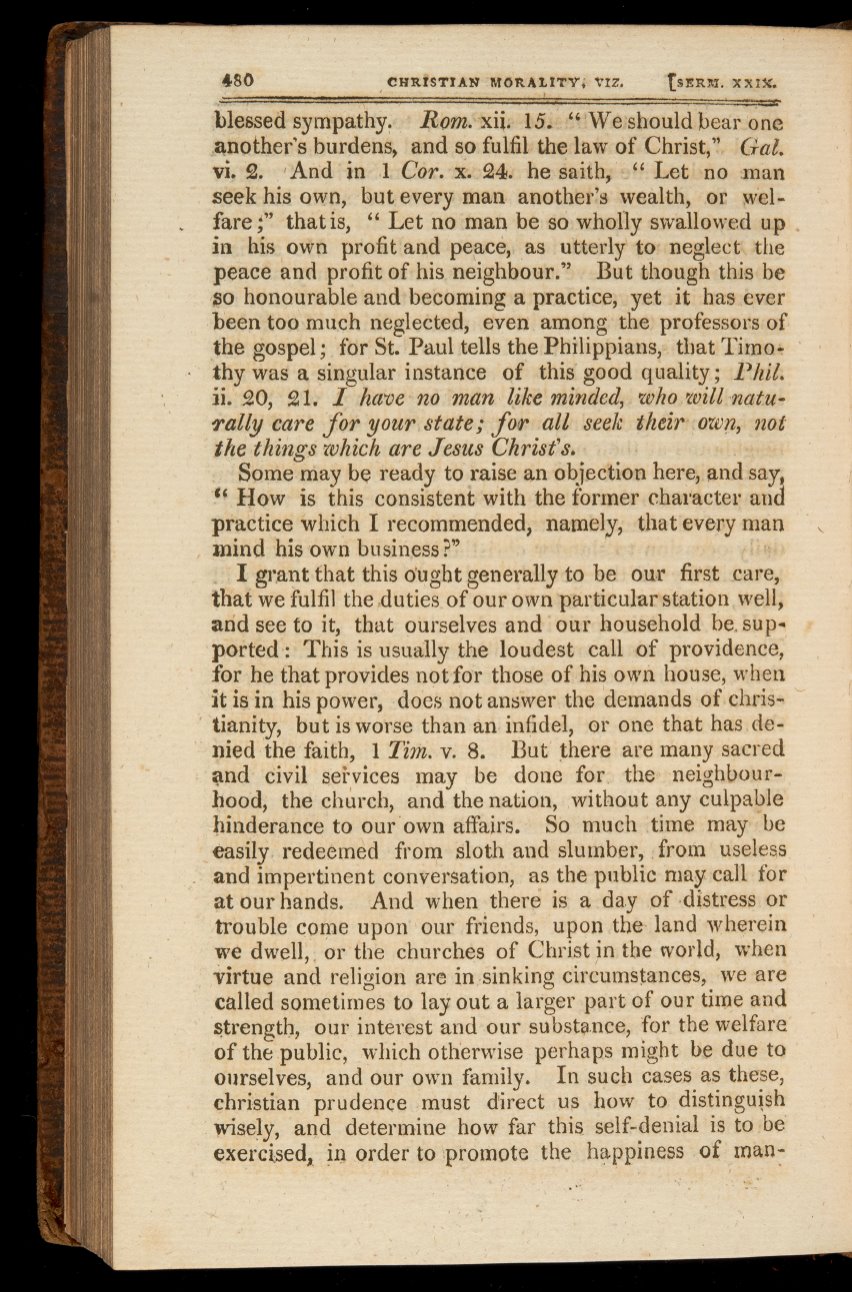

480
CHRISTIAN
MORALITY',
VIZ.
'DRAM. XXIX.
blessed
sympathy.
RM.
xii.
15.
"'We
should bear one
another's
burdens,
and
so fulfil
the
law
of
Christ,"
Gal.
vi. 2.
And
in
1
Cor.
x.
24.
he saith,
"
Let
no
man
seek
his own,
but
every man
another's
wealth, or
wel-
fare
;"
that
is,
"
Let
no
man be
so
wholly swallowed up
in
his own
profit and
peace,
as
utterly
to neglect the
peace and
profit
of
his
neighbour." But though
this be
so
honourable and
becoming
a
practice, yet
it
has ever
been
too much neglected, even among the professors
of
the
gospel;
for
St.
Paul
tells
the
Philippians, that Timo-
thy
was a
singular instance
of this
good
quality;
Phil.
íi. 20, 21.
I
have
no
man like
minded, who
will
natu-
rally
care
for
your
state;
for
all
seek
their
own,
not
the things
which
are Jesus
Christ's.
Some may
be
ready
to raise
an objection
here,
and
say,
"
How
is
this
consistent
with
the former
character
and
practice
which
I
recommended,
namely,
that
every man
mind
his own business?"
I
grant that
this
ought
generally to
be
our
first care,
that
we fulfil
the
duties of our
own
particular
station
well,
and
see to
it,
that
ourselves
and
our
household
be.
sup
-
ported
:
This
is
usually
the
loudest
call
of
providence,
for
he
that
provides
not
for those
of
his
own house, when
it
is
in
his
power, does
not
answer the demands
of
chris-
tianity,
but
is
worse
than
an
infidel,
or
one
that
has
de-
nied the
faith,
1
Tim.
v.
8.
But
there are
many
sacred
and
civil services
may
be
done for the neighbour-
hood, the church, and the nation, without any culpable
hinderance
to
our
own affairs.
So
much time
may be
easily redeemed from sloth
and slumber,
from
useless
and impertinent
conversation,
as
the public may
call
for
at
our
hands.
And
when
there
is
a
day
of
distress
or
trouble
come
upon our
friends,
upon the
land
wherein
we dwell,
or
the churches
of
Christ
in
the
world,
when
virtue and
religion
are
in sinking circumstances,
we
are
called sometimes
to
lay
out
a
larger
part
of
our
time
and
strength,
our interest
and our substance, for
the welfare
of
the public,
which
otherwise
perhaps
might
be
due
to
ourselves,
and our
own
family.
In
such
cases as these,
christian prudence must direct
us how
to distinguish
wisely,
and determine
how
far
this self
-
denial
is
to
be
exercised, in
order
to
promote
the happiness
of
man-

















